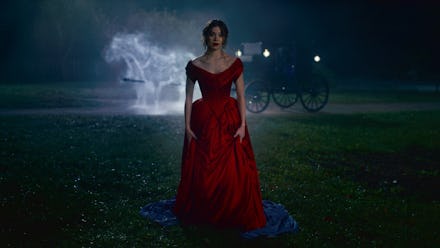‘Dickinson' flips everything you learned about female poets upside down

I really dig Dickinson, the new Apple TV+ series about 19th century poet Emily Dickinson. I like that every episode is named after and centers on a different poem, sneaking a little literary criticism into my TV time. And I’m dying to find ways to incorporate the costumes, lacy white Victorian dresses galore, into my fall wardrobe.
A lot of coverage of Dickinson so far has focused on its queerness and millennial-ness. The New York Times couldn’t help noting that the “very modern” retelling of the poet’s life includes twerking. That makes the show sound like a Riverdale-ish redux of American literature, and it’s really not that at all. Creator Alena Smith’s show is a historical dark comedy, and what makes it so compelling is how it frames timeless themes of sexuality, artistry, and otherness in the context of the 1850s as well as modern times. Dickinson transforms a female literary genius who’s usually conveyed as a kooky shut-in as someone rebellious, complex and cool.
Emily Dickinson, like a lot of other female literary geniuses of eras past, had to contend with the fact that being a writer and a woman made her a freak. What’s more, she swore to never marry, was in love with her sister-in-law Susan, and died at age 55 in her parents’ house. Dickinson does a nice job of underscoring Emily’s quirks — a penchant for collecting bird nests, for example — while posthumously crusading for the poet’s civil rights and painting her as a rebel rather than a spinster.
It helps enormously that the poet is played by a magnetic actress: Hailee Steinfeld, who shot to fame at 13 in the Coen brothers’ 2010 film True Grit (starring as a farm girl who hires Jeff Bridges to avenge her father’s murder). She’s got experience playing plucky protagonists, and that fiery energy infuses the enigmatic poet with real allure. “It’s empowering to play this character who would stop at nothing to do whatever made her feel creatively alive as an artist,” Steinfeld told Vulture.
The show feels resonant right now partly thanks to the #MeToo movement and resistance to the Trump era. Sometimes the show is heavy-handed in that respect, like with all its talk of a politically divided nation and foreshadowing of the Civil War. (In addition to Dickenson scholars, Smith consulted with Civil War historians while writing the show. “In the same way that we look around and feel like everything is changing so fast under our feet, [...] many ideals that the country had only been recently built upon were proven to be deceptive or untenable,” Smith told Vulture.)
Dickinson also premiered at a moment when it seems culture more broadly has been revisiting “crazy literary ladies” through a more sympathetic lens. On the closing track of her latest album, Norman Fucking Rockwell, Lana Del Rey croons:
I've been tearing around in my fucking nightgown / 24/7 Sylvia Plath / Writing in blood on my walls / 'Cause the ink in my pen don't work in my notepad / Don't ask if I'm happy, you know that I'm not / But at best, I can say I'm not sad / 'Cause hope is a dangerous thing for a woman like me to have
It’s compelling to consider a glamorous pop singer thinking of herself as a Plath type. It’s an image that resonates for me, a freelance writer who spends most of her days home alone with her laptop, sometimes feeling a little nuts. But until recently, the notion of leaning into the strange, solitary aspects of writing (and life in general) seemed somehow shameful.
A few years ago, I picked up The Bell Jar, a book I’d always been afraid to read. I thought it’d be too depressing and had trouble shaking the image of the author with her head in an oven — really stupid, probably socially ingrained reasons not to read Sylvia Plath, for the record. When I finally did read it, The Bell Jar shook me to my core. I saw so much of myself in Plath’s protagonist — a young writer who suddenly finds herself “doing the thing” in New York City and feels swept away and overwhelmed by it all.
Similarly, when Alena Smith got interested in Dickinson as a young writer in her early 20s, she empathized with how the poet felt “trapped and misunderstood the way a lot of young artists do” and was captivated by Emily’s “morbid wit.” Watching her show feels a little like reading The Bell Jar did — but soundtracked to Billie Eilish and featuring the aforementioned twerking, of course. But in all seriousness, Dickinson is awesome because it peels back the bleak shroud around the poet’s life and invites us to party with her. And it turns out Emily can totally hang.